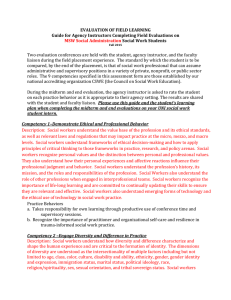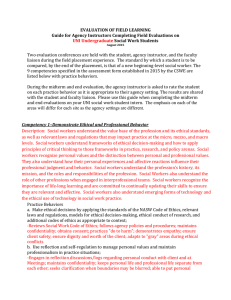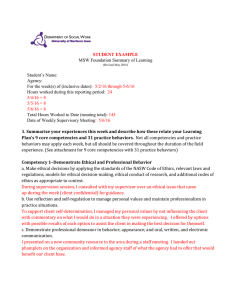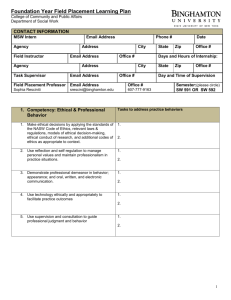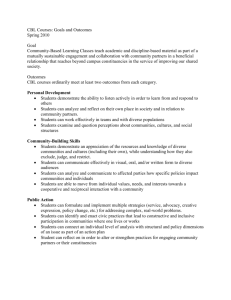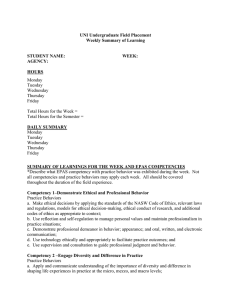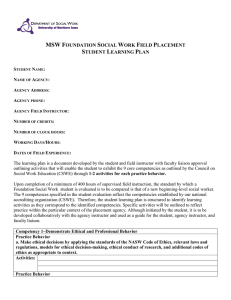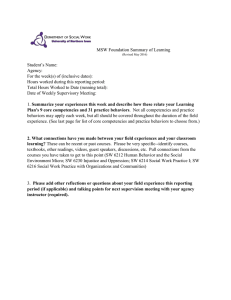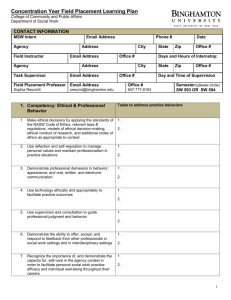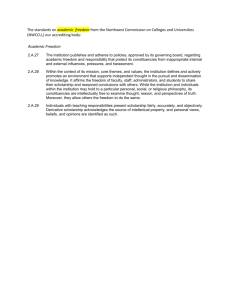EVALUATION OF FIELD LEARNING Social Work Students MSW Foundation
advertisement
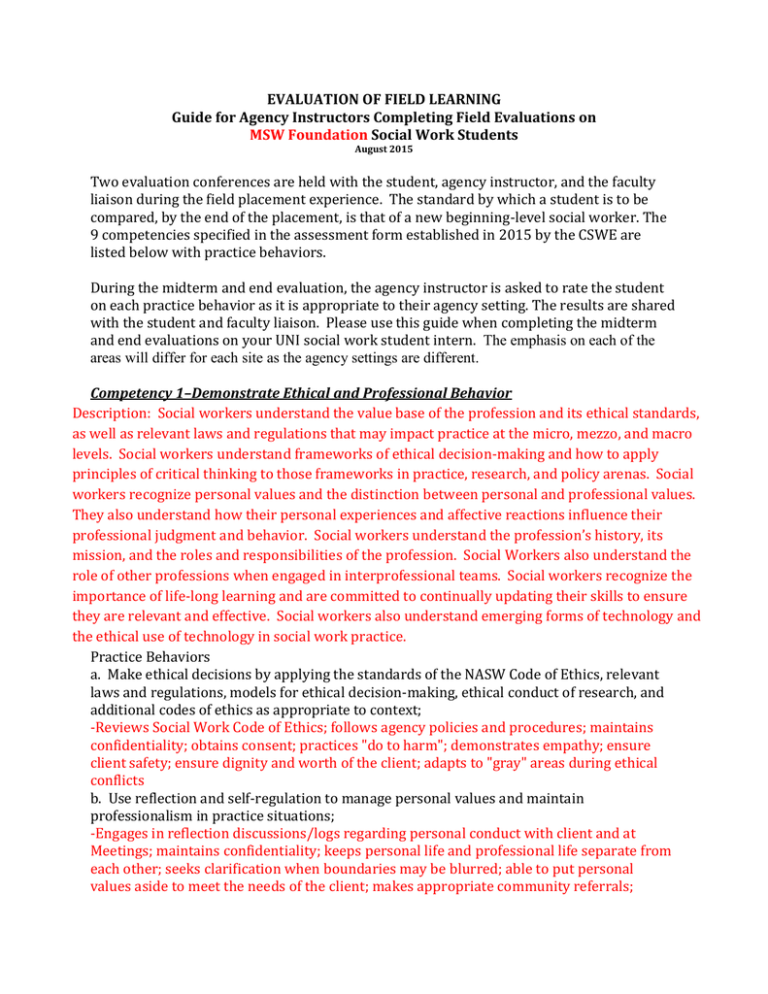
EVALUATION OF FIELD LEARNING Guide for Agency Instructors Completing Field Evaluations on MSW Foundation Social Work Students August 2015 Two evaluation conferences are held with the student, agency instructor, and the faculty liaison during the field placement experience. The standard by which a student is to be compared, by the end of the placement, is that of a new beginning-level social worker. The 9 competencies specified in the assessment form established in 2015 by the CSWE are listed below with practice behaviors. During the midterm and end evaluation, the agency instructor is asked to rate the student on each practice behavior as it is appropriate to their agency setting. The results are shared with the student and faculty liaison. Please use this guide when completing the midterm and end evaluations on your UNI social work student intern. The emphasis on each of the areas will differ for each site as the agency settings are different. Competency 1–Demonstrate Ethical and Professional Behavior Description: Social workers understand the value base of the profession and its ethical standards, as well as relevant laws and regulations that may impact practice at the micro, mezzo, and macro levels. Social workers understand frameworks of ethical decision-making and how to apply principles of critical thinking to those frameworks in practice, research, and policy arenas. Social workers recognize personal values and the distinction between personal and professional values. They also understand how their personal experiences and affective reactions influence their professional judgment and behavior. Social workers understand the profession’s history, its mission, and the roles and responsibilities of the profession. Social Workers also understand the role of other professions when engaged in interprofessional teams. Social workers recognize the importance of life-long learning and are committed to continually updating their skills to ensure they are relevant and effective. Social workers also understand emerging forms of technology and the ethical use of technology in social work practice. Practice Behaviors a. Make ethical decisions by applying the standards of the NASW Code of Ethics, relevant laws and regulations, models for ethical decision-making, ethical conduct of research, and additional codes of ethics as appropriate to context; -Reviews Social Work Code of Ethics; follows agency policies and procedures; maintains confidentiality; obtains consent; practices "do to harm"; demonstrates empathy; ensure client safety; ensure dignity and worth of the client; adapts to "gray" areas during ethical conflicts b. Use reflection and self-regulation to manage personal values and maintain professionalism in practice situations; -Engages in reflection discussions/logs regarding personal conduct with client and at Meetings; maintains confidentiality; keeps personal life and professional life separate from each other; seeks clarification when boundaries may be blurred; able to put personal values aside to meet the needs of the client; makes appropriate community referrals; promotes client self-determination; puts client first; acts on wisdom, experience and supervision versus emotion c. Demonstrate professional demeanor in behavior; appearance; and oral, written, and electronic communication; -Dresses appropriately for activity/setting; uses appropriate language; professional in oral and written communication; punctual/prompt; professional with agency partners; calm; organized; prepared; listens well to others; clearly articulates in speaking and writing; easily understood by clients, colleagues and community partners; documents correctly; adjusts language to reach intended audience; adapts professional conduct to effectively communicate with audience (client, colleague, community partner); engages in self-care d. Use technology ethically and appropriately to facilitate practice outcomes; and -Proper use of email; proper use of online agency procedures and documentation e. Use supervision and consultation to guide professional judgment and behavior. -Consults with supervisor or other agency staff before, during and/or after client contacts/agency activities; reviews/uses employee manuals; reviews Social Work Code of Ethics; attends professional development activities; delivers appropriate and efficient services; considers all relevant information and data prior to making decisions; knowledgeable of local, state and/or federal laws that impact delivery of services Competency 2 –Engage Diversity and Difference in Practice Description: Social workers understand how diversity and difference characterize and shape the human experience and are critical to the formation of identity. The dimensions of diversity are understood as the intersectionality of multiple factors including but not limited to age, class, color, culture, disability and ability, ethnicity, gender, gender identity and expression, immigration status, marital status, political ideology, race, religion/spirituality, sex, sexual orientation, and tribal sovereign status. Social workers understand that, as a consequence of difference, a person’s life experiences may include oppression, poverty, marginalization, and alienation as well as privilege, power, and acclaim. Social workers also understand the forms and mechanisms of oppression and discrimination and recognize the extent to which a culture’s structures and values, including social, economic, political, and cultural exclusions, may oppress, marginalize, alienate, or create privilege and power. Practice Behaviors a. Apply and communicate understanding of the importance of diversity and difference in shaping life experiences in practice at the micro, mezzo, and macro levels; -Matching diversity issues and needs to assessments and treatment planning; understands impact of trauma on the client b. Present themselves as learners and engage clients and constituencies as experts of their own experiences; and -Expresses interest in and spends time learning about diverse issues regarding clients and communities; shares knowledge of diverse populations; participates in professional development to learn diversity issues; listening to clients; understanding client needs at the micro, mezzo and macro levels c. Apply self-awareness and self-regulation to manage the influence of personal biases and values in working with diverse clients and constituencies. -Respects the wishes and practices of clients; treats clients with respect, dignity and fairness; uses appropriate language/terminology with client base; recognizes when personal biases may impact/influence ability to serve client; keeps personal commentary to self or at a minimum Competency 3 –Advance Human Rights and Social, Economic, and Environmental Justice Description: Social workers understand that every person regardless of position in society has fundamental human rights such as freedom, safety, privacy, an adequate standard of living, health care, and education. Social workers understand the global interconnections of oppression and human rights violations, and are knowledgeable about theories of human need and social justice and strategies to promote social and economic justice and human rights. Social workers understand strategies designed to eliminate oppressive structural barriers to ensure that social goods, rights, and responsibilities are distributed equitably and that civil, political, environmental, economic, social, and cultural human rights are protected. Practice Behaviors a. Apply their understanding of social, economic, and environmental justice to advocate for human rights at the individual and system levels; and -Articulates the impact of oppression and discrimination on client base; understands agency, local, state and federal guidelines for addressing oppression and discrimination; gets involved in meeting client needs; educate agency and community members of client rights; understand entitlement programs; informs of and provides access to resources for all clients; informs client of their rights; promotes self-determination; makes suggestions of how to reach more clients b. Engage in practices that advance social, economic, and environmental justice. -Provide prevention education; participate in board meetings; participate in policy changes; participate in staff meetings; participate in case consultations; applies classroom learning to real cases/situations Competency 4 –Engage In Practice-informed Research and Research-informed Practice Description: Social workers understand quantitative and qualitative research methods and their respective roles in advancing a science of social work and in evaluating their practice. Social workers know the principles of logic, scientific inquiry, and culturally informed and ethical approaches to building knowledge. Social workers understand that evidence that informs practice derives from multi-disciplinary sources and multiple ways of knowing. They also understand the processes for translating research findings into effective practice. Practice Behaviors a. Use practice experience and theory to inform scientific inquiry and research; -Explores other social worker's and other discipline's point of views in relation to client services; reviews case notes; gathers multiple sources of information prior to making recommendations; engaged in and seeks clarification at staff meetings; consults with supervisor ; observes and provides feedback after meetings/professional development activities; considers variables that may impact services; understands and seeks out best practices b. Apply critical thinking to engage in analysis of quantitative and qualitative research methods and research findings; and -Completes evidence-informed practices seminar assignment (BA program); understand agency services; use supervision sessions to explore agency practices and how they align with evidence-informed research c. Use and translate research evidence to inform and improve practice, policy, and service delivery. -Knowledge of agency policies and procedures; understand entitlement programs; presentation to agency staff/community partners of evidence-informed practice(s)/programs Competency 5 –Engage in Policy Practice Description: Social workers understand that human rights and social justice, as well as social welfare and services, are mediated by policy and its implementation at the federal, state, and local levels. Social workers understand the history and current structures of social policies and services, the role of policy in service delivery, and the role of practice in policy development. Social workers understand their role in policy development and implementation within their practice settings at the micro, mezzo, and macro levels and they actively engage in policy practice to effect change within those settings. Social workers recognize and understand the historical, social, cultural, economic, organizational, environmental, and global influences that affect social policy. They are also knowledgeable about policy formulation, analysis, implementation, and evaluation. Practice Behaviors a. Identify social policy at the local, state, and federal level that impacts well-being, service delivery, and access to social services; -Understand federal, state and local policies that impact agency services and activities; makes appropriate community referrals; understanding of outreach services to reach client base b. Assess how social welfare and economic policies impact the delivery of and access to social services; -Observe practices of various agency staff and/or community partners; consult with supervisor regarding observations; attends professional development activities; understand entitlement programs; understanding role in contracting services for clients; adapt services to meet client needs; understand need for various assessments based client specifics (gender, age, disability area, etc.) c. Apply critical thinking to analyze, formulate, and advocate for policies that advance human rights and social, economic, and environmental justice. -Engage in discussions/activities that improve service delivery; participates on multidisciplinary teams Competency 6 –Engage with Individuals, Families, Groups, Organizations, and Communities Description: Social workers understand that engagement is an ongoing component of the dynamic and interactive process of social work practice with, and on behalf of, diverse individuals, families, groups, organizations, and communities. Social workers value the importance of human relationships. Social workers understand theories of human behavior and the social environment, and critically evaluate and apply this knowledge to facilitate engagement with clients and constituencies, including individuals, families, groups, organizations, and communities. Social workers understand strategies to engage diverse clients and constituencies to advance practice effectiveness. Social workers understand how their personal experiences and affective reactions may impact their ability to effectively engage with diverse clients and constituencies. Social workers value principles of relationship-building and interprofessional collaboration to facilitate engagement with clients, constituencies, and other professionals as appropriate. Practice Behaviors a. Apply knowledge of human behavior and the social environment, person-in environment, and other multidisciplinary theoretical frameworks to engage with clients and constituencies; and -Understands micro-mezzo-macro levels of influence on client needs and treatment planning; understands ecological system theory; conduct home visits; conducts interviews in client-centered environments; finds common ground with client; understands socio economic factors impacting functioning; utilizes different techniques to engage clients, especially resistive clients b. Use empathy, reflection, and interpersonal skills to effectively engage diverse clients and constituencies. -review client files prior to meeting them; validates client's feelings; demonstrations Reflection; considers the whole person when completing social histories; makes follow up contacts with client and family; engages in intake activities; participates in crisis management supports and services; reviews case file prior to client contact Competency 7 –Assess Individuals, Families, Groups, Organizations, and Communities Description: Social workers understand that assessment is an ongoing component of the dynamic and interactive process of social work practice with, and on behalf of, diverse individuals, families, groups, organizations, and communities. Social workers understand theories of human behavior and the social environment, and critically evaluate and apply this knowledge in the assessment of diverse clients and constituencies, including individuals, families, groups, organizations, and communities. Social workers understand methods of assessment with diverse clients and constituencies to advance practice effectiveness. Social workers recognize the implications of the larger practice context in the assessment process and value the importance of interprofessional collaboration in this process. Social workers understand how their personal experiences and affective reactions may affect their assessment and decision-making. Practice Behaviors a. Collect and organize data, and apply critical thinking to interpret information from clients and constituencies; -Knowledge and correct use of agency assessment tools; correct interpretation of data gathered from assessment tools; writes social histories, conducts child studies b. Apply knowledge of human behavior and the social environment, person-in environment, and other multidisciplinary theoretical frameworks in the analysis of assessment data from clients and constituencies; -Collects data from multiple sources; documents correctly; interviews clients and families; interviews community partners; understands what the client values c. Develop mutually agreed-on intervention goals and objectives based on the critical assessment of strengths, needs, and challenges within clients and constituencies; and -Engages appropriately with clients to reach consensus on goal(s) d. Elect appropriate intervention strategies based on the assessment, research knowledge, and values and preferences of clients and constituencies. -Align results of assessment data to appropriate interventions and/or referrals Competency 8 –Intervene with Individuals, Families, Groups, Organizations, and Communities Description: Social workers understand that intervention is an ongoing component of the dynamic and interactive process of social work practice with, and on behalf of, diverse individuals, families, groups, organizations, and communities. Social workers are knowledgeable about evidence-informed interventions to achieve the goals of clients and constituencies, including individuals, families, groups, organizations, and communities. Social workers understand theories of human behavior and the social environment, and critically evaluate and apply this knowledge to effectively intervene with clients and constituencies. Social workers understand methods of identifying, analyzing and implementing evidence-informed interventions to achieve client and constituency goals. Social workers value the importance of interprofessional teamwork and communication in interventions, recognizing that beneficial outcomes may require interdisciplinary, interprofessional, and interorganizational collaboration. Practice Behaviors a. Critically choose and implement interventions to achieve practice goals and enhance capacities of clients and constituencies; -Knowledge of agency interventions and supports; engages in joint planning with the client b. Apply knowledge of human behavior and the social environment, person-in environment, and other multidisciplinary theoretical frameworks in interventions with clients and constituencies; -Implements treatment plan; supervising implementation of treatment plan; makes appropriate referrals; skill development sessions c. Use inter-professional collaboration as appropriate to achieve beneficial practice outcomes; -Participates in staffings; participates in case consultations d. Negotiate, mediate, and advocate with and on behalf of diverse clients and constituencies; and -Provides crisis management services; advocates for clients during meetings e. Facilitate effective transitions and endings that advance mutually agreed-on goals. -Engages in progress reviews; modify goals and interventions as needed; participates in termination of services when appropriate Competency 9 –Evaluate Practice with Individuals, Families, Groups, Organizations, and Communities Description: Social workers understand that evaluation is an ongoing component of the dynamic and interactive process of social work practice with, and on behalf of, diverse individuals, families, groups, organizations and communities. Social workers recognize the importance of evaluating processes and outcomes to advance practice, policy, and service delivery effectiveness. Social workers understand theories of human behavior and the social environment, and critically evaluate and apply this knowledge in evaluating outcomes. Social workers understand qualitative and quantitative methods for evaluating outcomes and practice effectiveness. Practice Behaviors a. Select and use appropriate methods for evaluation of outcomes; -Knowledge of agency evaluation tools; correct use of agency evaluation tools b. Apply knowledge of human behavior and the social environment, person-in environment, and other multidisciplinary theoretical frameworks in the evaluation of outcomes; -Understands uniqueness of each client when evaluating progress c. Critically analyze, monitor, and evaluate intervention and program processes and outcomes; and -Collects data to determine progress, reviews client progress; review components of treatment plan; seek least restrictive options when appropriate d. Apply evaluation findings to improve practice effectiveness at the micro, mezzo, and macro levels. -Collection of agency data; correct interpretation of agency data; sharing out of agency data; create action plans based on agency data
